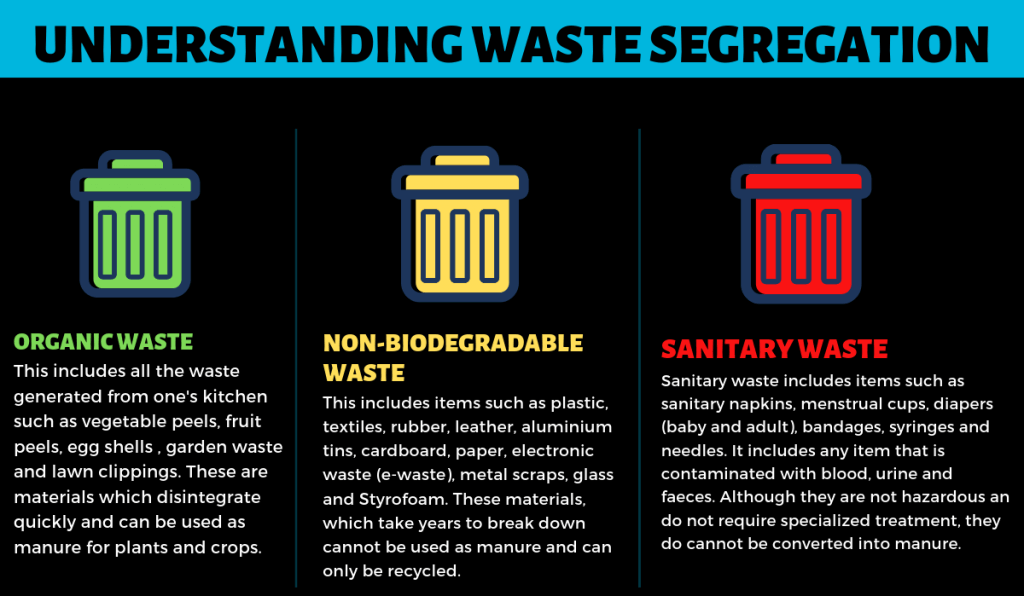The total waste estimated to be generated by the world population is approximately 2.1 billion tonnes every year which will only increase if humans keep generating waste. There are all kinds of waste:- food waste, chemical waste, plastic waste, glass/metal waste, etc. that are being expelled from homes, commercial complexes, factories, hospitals, and what not, because they are broken, stale, unrequired, spilt, or used.
To make do with our daily requirements, we need products and items which will come with a baggage called ‘waste’, but the need of the hour is that we make minimum or no waste at all. But why is making zero waste a daily commitment so significant?
Waste collection at landfill sites and disposal of chemicals in water bodies have a direct impact on the quality of the air we breathe, food that we consume, and water that we drink. Every element that goes into a human system is contaminated with hazardous radicals that are harmful and should not be consumed at all costs. Apart from health impacts, heaps of garbage has a direct impact on the earth’s climate. More elaborate reasoning:
1. Poor level of Water & Soil Quality: When the garbage is dumped in a landfill, the garbage mixes with the soil and degrades its quality, and further intoxicates the underground water that we humans consume.
2. Rise in Air Pollution & Alarming Change in Climate: Carbon dioxide, carbon monoxide, methane, ammonia, and other gasses are waste products that are released from garbage dumped into the open air. These harmful gases have an alarming effect on the atmosphere- depletion of the ozone layer, rise in temperature, melting of glaciers, floods, and more.
3. Adverse Impact on Human & Animal Health: People living near landfill sites breathe harmful air and drink contaminated water. They are suffering from infectious diseases that arise from the consumption of polluted everything.
Over 5,00,000 people die every year because of diarrhea in India upon consumption of poor drinking water. To fight this battle against pollution rising from heaps of garbage thrown without being segregated or the waste that is not treated, we as individuals have to take significant steps like making zero waste a daily commitment. To ensure zero waste, we can take the following steps:
- Don’t throw away left-over food! Instead, people can give food to beggars on the street or to dogs. There are over a million people in India who die of malnutrition.
- A society can set-up a mini bio-gas plant to reduce waste into reusable energy. These kinds of initiatives are very helpful in minimizing carbon emissions and preserving the environment from air pollution.
Over 5,00,000 people die every year because of diarrhea in India upon consumption of poor drinking water. To fight this battle against pollution rising from heaps of garbage thrown without being segregated or the waste that is not treated, we as individuals have to take significant steps like making zero waste a daily commitment. To ensure zero waste, we can take the following steps:
- Don’t throw away left-over food! Instead, people can give food to beggars on the street or to dogs. There are over a million people in India who die of malnutrition.
- A society can set-up a mini bio-gas plant to reduce waste into reusable energy. These kinds of initiatives are very helpful in minimizing carbon emissions and preserving the environment from air pollution.
- Install GoClean technology by Clean India Ventures which converts organic waste into compost or havan samagri. GoClean machine can convert over 1000 kg of waste in 24-48 hours. This is an impactful way to lower the waste generated from society and making the environment more sustainable and habitable for living.
Use plastic bags for future packaging and not throw them in dustbins. Plastic and other garbage material collectively pollute the environment to a level that is even more harmful, as the plastics do not decompose and also do not let other items into the garbage.
Over 5,00,000 people die every year because of diarrhea in India upon consumption of poor drinking water. To fight this battle against pollution rising from heaps of garbage thrown without being segregated or the waste that is not treated, we as individuals have to take significant steps like making zero waste a daily commitment. To ensure zero waste, we can take the following steps:
- Don’t throw away left-over food! Instead, people can give food to beggars on the street or to dogs. There are over a million people in India who die of malnutrition.
- A society can set-up a mini bio-gas plant to reduce waste into reusable energy. These kinds of initiatives are very helpful in minimizing carbon emissions and preserving the environment from air pollution.
- Install GoClean technology by Clean India Ventures which converts organic waste into compost or havan samagri. GoClean machine can convert over 1000 kg of waste in 24-48 hours. This is an impactful way to lower the waste generated from society and making the environment more sustainable and habitable for living.
- Use plastic bags for future packaging and not throw them in dustbins. Plastic and other garbage material collectively pollute the environment to a level that is even more harmful, as the plastics do not decompose and also do not let other items into the garbage.
- Recycle waste wherever possible, like in glass jars as planters, old books as a new binder, and what not. Recycling should be learned and preached to make the environment free from half of the waste produced. Like, you can buy a refill instead of buying a new pen.
